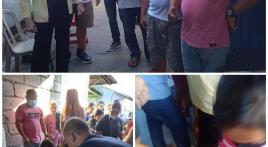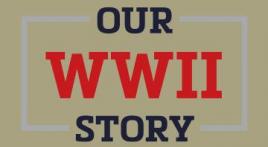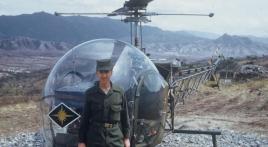Chapter 41: Joining the Marines From my book "From the Shadow of Coyote Mountain to the Base of Mount Diablo to the Base of Mount Diablo"
School became a drag, as I wasn’t doing very well, bored to death and getting mostly terrible grades. I was afraid that I wouldn’t graduate with my class because of bad attendance, poor grades and lack of inspiration.
My brother Walter had joined the Marine Corps, as had the brother of my friend Ronny Alexander.* Ronny and I decided to also join, but I was just seventeen so we had to wait until I was eighteen to sign up.
I don’t think either of us told anyone of our plan to enlist and we didn’t tell anyone good-bye. I know for sure that I didn’t, not even the on-again, off-again girlfriends in Oakland and Citrus Heights. I didn’t tell any of my family.
Ronny and I went to the Marine Enlistment Center in Hayward to investigate, a day before I was eighteen. The enlistment folks treated us really special, giving us lodging in San Francisco, meals and passes to a show.
The next morning, we were taken to the SFO Airport and told they would fly us to San Diego, where we would be sworn in and become Marines. We sat in the airport at SFO for the entire day, awaiting an opening on a flight to San Diego.
Later in the evening, they called our names and we boarded a DC-3 and took off for Burbank. I looked out the window and noticed a little oil trail developing behind one of the engines. By the time we landed in Burbank. I was sure we had lost ten gallons of oil down that wing, but nobody else seemed concerned.
We were in Burbank long enough to refuel, clean the oil off the wing and took off again for San Diego. We must have arrived there past midnight.
Everyone had been really pleasant to us so far. The airport personnel even politely directed us out some side doorway to an awaiting the Marine Corps bus, out of view of anyone but the bus driver, a Marine Private and a Marine Sgt. who would direct us from then until we arrived at MCRD. (Marine Corps Recruit Depot, San Diego.)
That was the end of “nice” for several months. We stood outside the bus and the Marine Sgt., called our names after telling us to respond, “Here Sir.” The first response was a weak one and that got the culprit yelled at and all of us informed, “I can’t hear you!” yelled at us by the Sgt. in the loudest voice I had heard in my life.
The next guy yelled his, “Here Sir” and was told to board the bus. Unfortunately for him, he was wearing his hair in a queue, which the Sgt. “mistook” for a handle, which he grabbed onto to help the recruit aboard the bus. They missed the open doorway and the recruit slammed head first into the side of the bus with the full weight of the Sgt. pushing him, resulting in a resounding thud. Then the recruit sank to the pavement, half conscious and so on it went until he revived himself enough to drag himself onto the bus.
We finally all survived the roll call and the boarding procedure. Some recruits got more help than others, and none of it needed, nor warranted. Thankfully we didn’t talk back. It just seemed that would be the wrong thing to do at the moment.
We were driven to the Marine Corps Recruit Depot in San Diego. Recruit Class 180, July 1, 1954. There we were directed to enter some building and find a bunk. We dashed inside and found a bunk to our liking, just a bunk, no mattress, a spring, but nothing else. Just bare bunks, one up, one down and row after row of them. Some sat on them, others tried to lie down and catch a nap. That lasted just long enough for us to think we were okay doing this, when in bounded some miniature Cpl. with an attitude of a seven foot tall bully, and informed us that he hadn’t given us permission to sit, lie down or to do anything. In his presence, from now on, we would stand at attention beside the head of our bunk until he gave us permission to do more than breathe. From this point we were to breathe quietly and the Marine Corps would inform us of everything else we were to do. We were to do nothing on our own, only with the express permission of the Marine Corps, which meant for us recruits, from anyone in uniform.
There was an hour-long tirade about what all he wanted from us and what the ever benevolent Marine Corps was providing for us, which was everything known to man to insure our survival and nothing else. There was nothing we needed that wouldn’t be provided and if we had anything that wasn’t provided to us by the Marine Corps, woe unto us.
We were to wear what we had on until chow in the morning, after which we would be given clothes to wear and a bucket with all our necessities in it. Chow tuned out to be S*** on a Shingle, which I immediately threw up, and the clothes were dungarees, lest we look too pretty.
We were informed that we would be placed on a schedule, when the Marine Corps determined that we were ready, which turned out to be a month later, when the USMC finally found a Drill Instructor for us. Until that time, we ran, marched, did pushups and duck-walked throughout the days and half the night, directed by some wanna-be Drill Instructors.
We spent the days picking up cigarette butts and cleaning our barracks, which were Quonset Huts with concrete floors. We would scrub the floors with buckets of sand, water, and soap, and then do it again the next day. We marched for hours and ran farther than we thought was humanly possible. We did more pushups than any of us ever thought possible and learned to wash clothes with a bar of soap and a bristle brush, outside on a wooden wash table with cold water from a garden hose.
Eventually, we were put onto a schedule and had a real bear of a Drill Instructor and a fairly nice Assistant Drill Instructor. The schedule was good, we had definite hours, though long, we knew when we’d be expected to be up and ready and other than a surprise inspections in the middle of the night, we got a full night’s sleep, three healthy meals and plenty of exercise.
We ran the obstacle course and cleaned our weapons. We polished boots and Boon dockers until they sparkled black. Boon dockers were low boots that had the nap of the leather on the outside, but we made them glisten with our newfound “spit shine” technique. Our rifles were our lifelines and we learned to clean and assemble them in seconds. How not to suffer “M1 thumb” which was when you got your thumb smashed by the bolt closing as you attempted to put dummy rounds in the rifle.
One fine day, we were all put on buses with our sea bag full of everything we owned, except the clothes on our back and about a fifty pound back pack full of whatever didn’t fit into the sea bag and our rifles slung over our shoulders. The buses took us out to La Jolla, where they dumped us off at the edge of town and we put our sea bags on a Marine Corps truck.
We kept our rifle and backpacks and marched the afternoon away, going up the hill to the north and arriving in the late afternoon at Camp Matthews where we were reunited with our sea bag and assigned to a tent. This would be our new home, no heat, cold-water showers and living in a tent with about six of us together.
The tents were built on a wooden platform, so we had a floor under us. In the middle of the tent was an oil stove that had never seen oil and never would. But it would have kept us warm if the Marine Corps thought we needed to be warm.
We had mess duty for a week, which gave us all a chance to learn the workings of a kitchen and how to keep it clean. The cook asked if anyone knew how to work a sewing machine and I thought that would be better than peeling potatoes so I raised my hand. That got me in charge of the laundry.
I counted everything to make sure the contractor hadn’t miscounted, then, with a needle and thread, made repairs where possible. Most of that consisted of sewing on buttons. I also handed out the clean laundry and took in the dirty and counted the pieces and sent it to be washed.
When I wasn’t busy, I helped scrub the kitchen and dining area. We ate well, but these were very long hours. We arose at three in the morning and were not in bed until ten or eleven at night.
The best part of boot camp was the rifle range. We had to get up early, go to chow, march to the range, which was over a mile away. There we were taught how to fire our weapons. No ammo, just practice and more practice.
There were four firing positions, standing, kneeling, sitting and prone. All of us practiced these positions for days, then they gave us ammo and we got to fire at the targets for half the day. Then we marched back to a safe area, away from the range, for a bag lunch, back to the range and pulled targets all afternoon while the other half fired away at the targets.
We march back to the chow hall for dinner. After dinner we spent the evening cleaning our weapons. An inspection would follow and we’d then have an hour or so before “lights out,” at twenty two hundred. (For you non-military types, that’s 10:00 PM.) This was our free time in which to read and write letters, smoke in a smoking area, wash clothes and cold shower.
We also learned to throw grenades, fire mortars, shoot with the pistols; carbines, sub machine guns and the Browning Automatic Rifle,(BAR). These were fun-filled days for most of us, but tragic for some.
One heavy guy, not the brightest bulb in the box, had been passed down from platoon to platoon, after he repeatedly failed to meet standards of the Marine Corps, regarding his weapons training. He should have been discharged, but no Drill Instructor wanted failure on his record, so they passed him backward to the next recruit platoon.
Our DI decided to have some of the bigger guys, make him just disappear, on our way to the rifle range. Normally the taller recruits were in the front and the shortest in the back. The appointed day, we marched at double time out to the range. That is we did a slow jog. The ranks were also reversed with the shortest in front and the tallest in the rear. I was midway down the file. We got about half way to the range and the poor guy had to drop back as he couldn’t keep up the pace. When we got to the range he was no longer with us. We thought it odd that the DI didn’t get someone to retrace our steps and bring him back to the range. Since our day was so busy, we soon forgot about him and concentrated on our weapons lessons.
That night, as we marched back to the tent camp, which was the barracks for the rifle range troops, we heard a moaning from over a bank and the DI told us to ignore it and march “Eyes Straight Ahead” home. Some of us fell out of line and found the poor guy in a bad way. He had been beaten and laid out there just over a small embankment, but out of sight, all day in a very warm sun. We helped him out and got him back to the tent camp and somehow to the sick bay. I never saw him again, but our Drill Instructor had also disappeared. I did see the DI again a couple of years later. He was in a prison detail at Camp Pendleton, as a private, picking up cigarette butts and waste, near the prison on the main base. He was with other prisoners and an armed guard, who was watching them while they performed menial tasks to keep the base clean.
Our Assistant Drill Instructor finished out our schedule with us and nothing was ever officially told to us about the change of DI’s, or any disposition of the obvious crime that had been committed. We eventually graduated from boot camp and were assigned to our future destination.
Ronny went to Camp Pendleton, the main base and I went to Camp Delmar, a subsidiary base of Camp Pendleton, which was the Amphibious Battalion’s home. This time the Marine Corps put us in trucks, with all our gear, and drove us to our destinations. That first move was to get us all to Camp Pendleton. Some went off to other assignments in the following days.
I was to be mechanic in the 3rd Amphibious Battalion. This was just after the finish of the Korean War and the 1st Marine Division was still overseas, so the result was, there weren’t nearly as many Marines at Camp Pendleton, or Delmar, as would normally have been the case.
Our barracks were newer than the WWII ones and the Mess Hall served family style with table clothes and meals were of the best quality and variety.
My place of work was down on the beach. There were probably a 150 LVTP3’s (Landing Vehicle Tracked, Production 3) there, that were tracked landing craft from the latter part of the WWII and some from the years before the Korean Conflict.
There were a couple of large warehouses and a shop that had next to nothing going on in it. Basically, we went to the shop and smoked cigarettes and went to lunch. Once in a while, we drove a tractor out onto the beach or into the pond in front of the shop, but mostly did nothing productive. Everything seemed to be in a holding pattern awaiting the return of the 1st Marine Division.
Near Thanksgiving 1954, I was given ten days leave, and told I would be sent to Japan. I went home on leave and wasted ten days trying to repair a couple of bad relationships and stirred up a new one, which went nowhere either.
Perry got me to go for a ride with him and a girlfriend and her cousin. He had a 1935 Ford Convertible Coupe, with a rumble seat. The cousin and I rode to the Russian River in the rumble seat. I felt like I would freeze to death before we got home, but fortunately the cousin knew well how to keep a young man warm, so I survived that. That ride caused another rift with the high school girlfriend and brought my relationship count back to zero, before the ten days were over. Even the cousin had been disappointed that I was such a dull boy. (But I could have been taught, if they just had the patience to do it.)
This Book is available from Amazon.com




